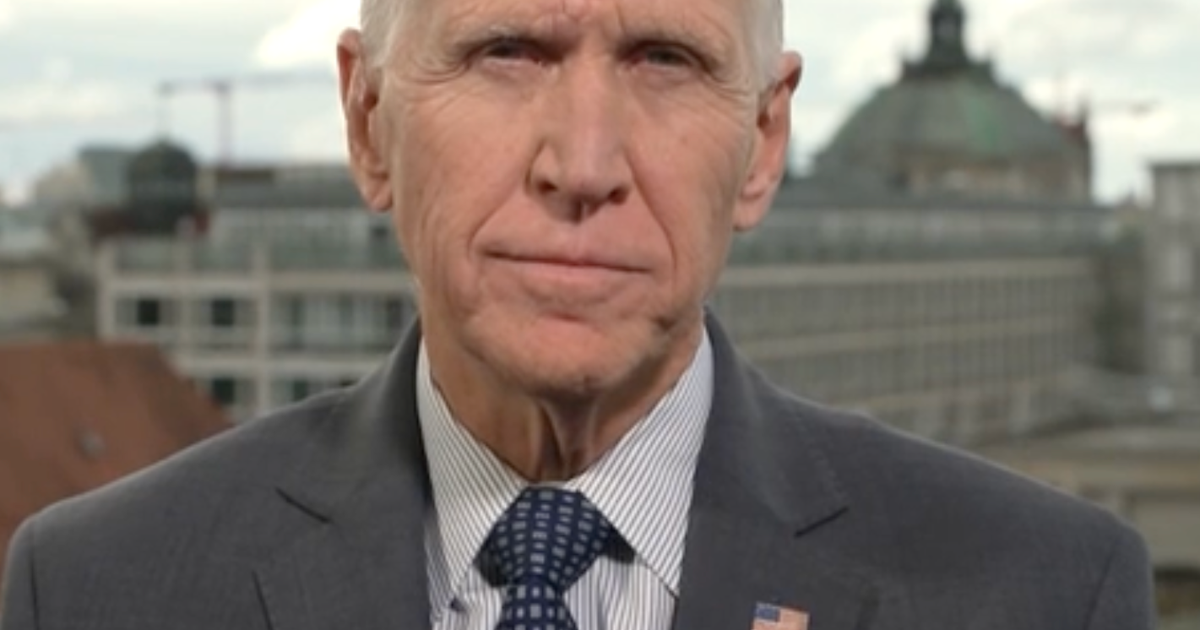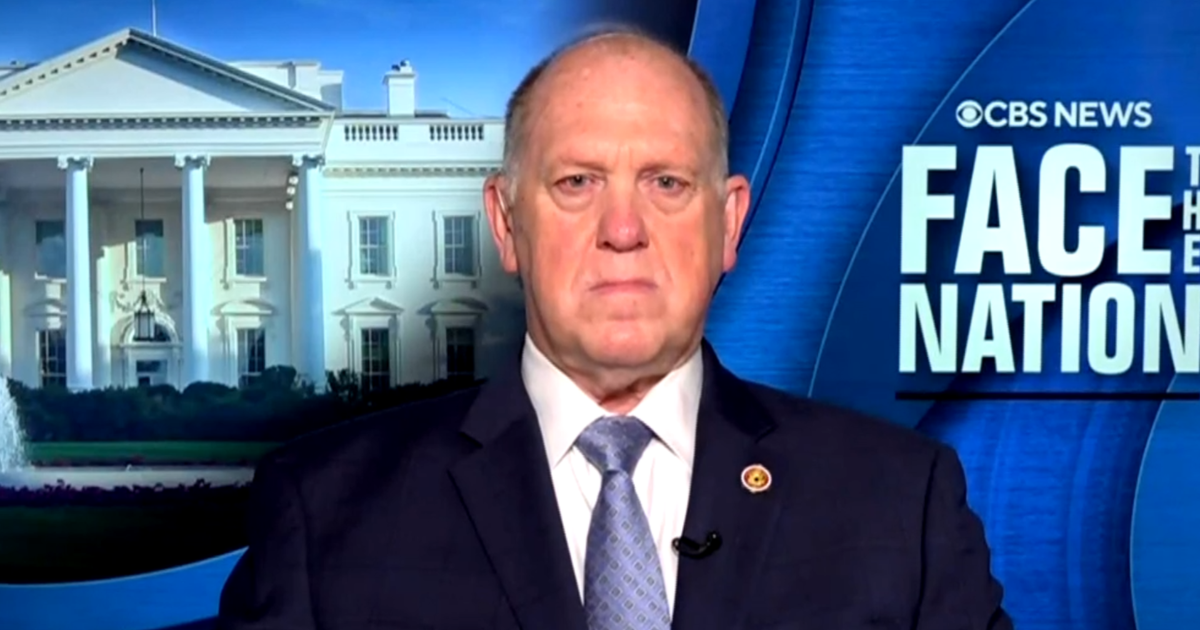Transcript: National Security Adviser Jake Sullivan on "Face the Nation," Nov. 12, 2023
The following is a transcript of an interview with National Security Adviser Jake Sullivan that aired on Nov. 12, 2023.
MARGARET BRENNAN: We're joined now by White House National Security Adviser Jake Sullivan. Jake, welcome back to the program. The fighting seems very intense in and around Gaza. Doctors Without Borders has called on the Israeli government to, quote, end its unrelenting assault on Gaza's health system. Does the U.S. believe that this is an accurate description of what's happening? Is the U.S. telling Israel not to hit hospitals?
NATIONAL SECURITY ADVISOR JAKE SULLIVAN: Well, Margaret, without getting into intelligence information, we can just look at the open source reporting that Hamas is using hospitals, as it uses many other civilian facilities, for command and control, for weapons storage, to house its fighters. And this is a violation of the laws of war. That being said, Margaret, the United States does not want to see firefights in hospitals, where innocent people, patients receiving medical care, are caught in the crossfire, and we've had active consultations with the Israeli Defense Forces on this. In fact, just yesterday, the Israeli Defense Forces themselves said that they- on the record, publicly, said that they are looking for ways to be able to ensure the safety and security of individual patients in those hospitals, while they also try to figure out a way to deal with the fact that Hamas is operating in a way that's outside the bound- bounds of any civilized concept of how you would think about using a hospital, using human shields. So it's an active conversation, but the bottom line is, we don't want to see firefights in hospitals.
MARGARET BRENNAN: Okay. You don't dispute, then, the Israeli assertion that Hamas has a command center underneath Al Shifa Hospital.
JAKE SULLIVAN: I'm not going to get into a specific assertion related to a specific hospital because that would be getting into intelligence matters. But, broadly speaking, we can see from open source reporting, that there is a track record, a pattern, of Hamas historically and in this conflict using hospitals and other civilian facilities for these purposes.
MARGARET BRENNAN: I want to ask you about the hostages, roughly 240, still being held by Hamas. We had the opportunity to speak with Congressman Mike McCaul from Israel where he had just met with the Israeli prime minister. And he told us that Israel is considering Hamas's proposal that Israel release Palestinian women and children from prison in order to obtain the hostages held by Hamas. Is that something the U.S. thinks should happen?
JAKE SULLIVAN: Well, Margaret, you'll understand if I'm very careful in how I answer this question, because the negotiations are delicate, they're high stakes. What is at stake is the recovery of a significant number of innocent people, including innocent Americans, currently being held hostage by Hamas, a murderous terrorist organization. It is the case that there are active negotiations underway between Israel and Qatar, who is communicating with Hamas, and the United States is involved in those discussions, very much involved in those discussions. But I'm not going to get into the specifics of what's on the table, only to say that we are actively working to ensure the safe return of every American being held hostage and every other person being held hostage by Hamas.
MARGARET BRENNAN: There are still roughly 400 Americans stuck in Gaza, according to the State Department, will they get out?
JAKE SULLIVAN: We are determined to ensure that they get out. Many have gotten out. Many are still there, as you mentioned, not just American citizens, but also their immediate family members. And we're trying to create a circumstance where every one of them can get safe passage out of Gaza. The gate has been open and closed. The lists have included Americans some days and not other days. But the bottom line is today the gate is open. We are moving American citizens and their family members out and in the days ahead. We hope to ensure that every American who wants to leave Gaza is able to do so safely.
MARGARET BRENNAN: Jake, this past week, a top State Department official testified to Congress that the Gaza health ministry's estimates of 11,000 Palestinian dead may in fact be an undercount. Does the White House share that assessment?
JAKE SULLIVAN: We don't have fidelity on the numbers of casualties, fatalities in Gaza. We don't know how many are fighters and how many are innocent civilians. But as I have said before, and as Secretary Blinken has said before, we do know there are thousands of innocent civilians who have been killed in the military operations that began after October 7. And every loss of life of an innocent person whether it's Palestinian, Israeli, anyone is an absolute tragedy and we grieve for every one of those lives and we continue to reinforce the proposition that Israel has the right indeed the responsibility to go after Hamas who continues to represent a threat to the State of Israel. But it must do so in a way that's consistent with the laws of war.
MARGARET BRENNAN: And Secretary Blinken also said too many Palestinians had died to date. I want to zero in on the future, which I know you have talked about from day one, what will happen in Gaza next, and you've pressed the Israeli Government on this point. Secretary Blinken has been clear that it's the West Bank and Gaza that needs to be under unified control, and the Palestinian- Palestinian Authority likely to govern that. It doesn't sound like the Netanyahu government is on the same page as the Biden administration because the prime minister said something very different just yesterday.
JAKE SULLIVAN: Well, from our perspective, the way forward- the basic principles of the way forward are straightforward, and this is something that Secretary Blinken laid out publicly this past week. No reoccupation of Gaza, no forcible displacement of the Palestinian people. Gaza can never be used as a base for terrorism in the future and Gaza's territory should not be reduced. Secretary Blinken also said that ultimately, we do want to see the reconnection, the reunification of control between the West Bank and Gaza under Palestinian leadership. The Palestinian Authority is the current leadership on the West Bank. But ultimately, it's gonna be up to the Palestinian people to decide their future, who governs them and the United States will support a process--
MARGARET BRENNAN: --There haven't been elections held in ages.
JAKE SULLIVAN: Well, that's right, Margaret, there haven't been elections held since the early 2000s. But post October 7, we can't go back to the way things were on October 6. And that goes for ensuring that Hamas cannot represent a continuing threat to Israel. And in fact, Hamas spokespeople have said they want to repeat October 7 again and again, until Israel is wiped out, that they want to be in a permanent state of war with Israel. That was on the front page of The New York Times out of the mouth of a Hamas spokesman. So Israel is going to prosecute this campaign against a terrorist group. But we also can't go back to October 6 when it comes to governance, and it will ultimately be up to or should be up to the Palestinian people to decide what their future governance looks like. And that should involve a reconnection, as Secretary Blinken has said, of the West Bank and the Gaza Strip.
MARGARET BRENNAN: Jake, before I let you go, I have to ask you about this significant summit between President Xi Jinping of China and President Biden that's about to take place. There still is no defense minister officially since the last one was removed or disappeared. What does reestablishing military ties actually look like? And are you confident you can get that done this week?
JAKE SULLIVAN: Well, this has been a priority for President Biden. He believes that having military-to-military communication is necessary to manage competition responsibly, and to ensure that competition does not turn into conflict. And we need those lines of communication so that there aren't mistakes or miscalculations or miscommunication. And so that could take place at every level from the senior leadership of our defense department and their defense ministry, all the way down to the tactical operational level, on the water and in the air in the Indo Pacific. I'm not going to get ahead of any announcements that the President might make coming out of the meeting. But I will say the President is determined to see the reestablishment of military-to-military ties because he believes it's in the US national security interest.
MARGARET BRENNAN: And will the President ask him to stop buying Iranian oil on the cheap, given what Iran is doing to U.S. troops in the region?
JAKE SULLIVAN: Well, the United States has sanctions imposed on Iran's sales of oil, those sanctions have been in place for years now. And we have only strengthened them in the Biden administration in terms of the number and types of sanctions that have been put in place. And certainly, the question of Iran's nuclear program and the threat it poses will be on the agenda, as will the threat that Iran poses to regional stability, and the threat it poses to U.S. forces in the region.
MARGARET BRENNAN: Jake Sullivan, thank you for your time, Face the Nation will be back in one minute. Stay with us.



